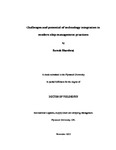Challenges and potential of technology integration in modern ship management practices
| dc.contributor.supervisor | Roe, Michael | |
| dc.contributor.author | Bhardwaj, Suresh | |
| dc.contributor.other | Faculty of Arts, Humanities and Business | en_US |
| dc.date.accessioned | 2013-12-03T16:17:29Z | |
| dc.date.available | 2013-12-03T16:17:29Z | |
| dc.date.issued | 2013 | |
| dc.identifier | 10361843 | en_US |
| dc.identifier.uri | http://hdl.handle.net/10026.1/2840 | |
| dc.description.abstract |
This thesis explores the challenges and potential of technology integration in current ship management practices. While technology advancements were designed to be contributing to minimising task complexity, issues such as fatigue, increased administrative burden and technology assisted accidents still plague the industry. In spite of the clearly recognisable benefits of using modern technology in the management of ships, in practice its application appears lacking by a considerable margin. The main driver of the study was to appreciate the cause of this disparity. The study first reviewed a wide body of literature on issues involving the use of technology which included academic literature with empirical evidences and theoretical explanations of implementation of technology at work. With the help of the extant knowledge this research embarked on providing an explanation to the gap that existed in the application of technology in the shipping industry. By taking a case study approach the thesis looked into the induction and integration of technology in the management and operation of ships that primarily interfaced closely between the ship and its management unit on shore. Three companies with mutually diverse management setup were studied. The fourth case comprised of purposefully selected senior members of ships’ staff. The analysis of the data revealed that the manifestation of the gap in technology implementation is caused by deeper influences at work in the shipping industry. The un-optimised technology integration results in the seafarer, who is the keystone to the technology application, becoming a victim of the circumstances. The technology that was intended to ease operations and burdens ends up in controlling him, even leaving him under-resourced and causing fatigue.This was not an unintended outcome but the result of weak regulatory practices, short-term capital outlook and weakened labour practices in the shipping industry all caused by wider social and economic developments affecting not just this industry but businesses globally. The impact of such influences was however more acute in this industry resulting in such extreme consequence. By bringing to light the limited application of some fundamental principles of human-systems integration, this study has attempted to expand the boundaries of research on the subject and contributed to the holistic understanding of the various underlying factors that influence technology integration in ship management processes. | en_US |
| dc.language.iso | en | en_US |
| dc.publisher | University of Plymouth | en_US |
| dc.subject | Maritime Technology Integration | en_US |
| dc.subject | Optimisation | |
| dc.subject | Human-machine interface | |
| dc.subject | Ship Management | |
| dc.title | Challenges and potential of technology integration in modern ship management practices | en_US |
| dc.type | Thesis | |
| plymouth.version | Full version | en_US |
| dc.identifier.doi | http://dx.doi.org/10.24382/4076 |
Files in this item
This item appears in the following Collection(s)
-
01 Research Theses Main Collection
Research Theses Main


